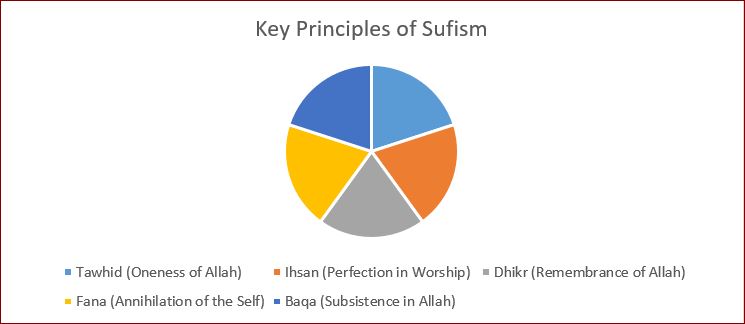Sufi Wisdom: Exploring Spirituality and Divine Love
Have you ever felt that deep yearning for something more, something that can fill your heart with love and peace? This is why Sufism is a special pathway in Islam. Here, we discuss Sufi Wisdom: Exploring Spirituality and Divine Love. Sufism shows ways to connect to Allah on a very personal and loving level, beyond mere rituals and regulations.
Spirituality and divine love play a critical role in Sufism. These teachings point us inward to find our real happiness, feel a divine love stronger than anything on this planet, and purify our hearts and souls so that we can reach out to Allah and further experience His love. You will learn the meaning of Sufism, its history, and the principal ideas that serve as a beacon for Sufis in their spiritual journey.
We will also learn the distinctive practices they observe, the role of a Sufi master, and the beautiful poetry and aphorisms that express their ideas. Finally, we’ll see how Sufi wisdom can still be important and helpful in our lives today. To embark on a journey that would reveal the wonderful world of Sufi knowledge and the power of divine love.
Sufi Wisdom
Origins of Sufi Wisdom
Deeply influenced by Islamic mysticism, Sufi belief encompasses a rich tapestry of spiritual knowledge and practices tapped towards attaining an immediate and intimate experience of Allah. The Sufis’ roots trace to the early centuries of Islam, with further input evident from the pre-Islamic mystical traditions, the Quran, and the teachings of Prophet Muhammad. Over time, Sufism took further evolutionary steps influenced by union diversity. Despite this, it has held onto the elements with the union of inner purity and love for Allah.
Key Principles of Sufism
There are various important benchmarks and philosophies on which Sufism wisdom stands, directing believers along the path:

- Tawhid (Oneness of Allah): The conceptualization in the mind of divine unity, where it is made clear that whatever is there in life is but a reflection of one and only true Allah.
- Ihsan (Perfection in Worship): Living with perfection in worship and daily conduct, besides being conscious of Allah’s ever-presence.
- Dhikr (Remembrance of Allah): This is an attempt to create regular remembrance and support of Allah’s name, and it inflows a per-mean realization of the divine.
- Fana (Annihilation of the Self): The process of dissolving one’s individuality, ego, and subordinate cravings to be one with Allah.
- Baqa (Subsistence in Allah): The state of existence in and through Allah after Fana is achieved, thus exhibiting divine qualities in one’s actions.
Role of Spirituality in the Sufi Practice
Sufi exercise is based on spirituality, which draws the follower to a deep personal transformation. Spirituality in Sufism entails ridding oneself of worldly sensorial distractions, surpassing the concerns of this world, and, therefore, instantaneous personal attachment with Allah. Sufism gradually leads a Sufi through stages and states, maqamat and ahwal, of a process that brings him close to his creator.
The focus on religion enables followers to achieve an internal state of peace, love, and unity with the Creator that eventually translates into more abundant, satisfying, and meaningful ways of living. In applying this knowledge, one is empowered to appreciate the breadth and depth of this religious practice and its relevance to the pursuit of divine love and reality.
The Concept of Divine Love in Sufism
Explanation of Divine Love (Ishq-e-Haqeeqi)
In Sufism, divine love is referred to as Ishq-e-Haqeeqi. One can revel in the most sublime and purest form of love. This deep, unconditioned, and unconditional love for Allah goes far beyond the love we feel for human beings or things in this world. It is not based on the desires of an individual or on physical attraction but is an inner, spiritual, selfless attachment to Allah. For Sufis, this love is actually the very purpose of life and the way to enter the presence and beauty of Allah.
Role of Divine Love in a Sufi’s Life
Divine love plays a central role in one’s life as a Sufi. It guides his mind, his actions, and the whole way of living. The Sufis try to domesticate this love through constant remembrance of Allah, performing practices that will bring them nearer to the Divine, and purification of the heart from selfish desires. This love would change their lives into peace, compassion, and playfulness virtues. It would make one visualize and come to the reality of seeing Allah in everything and everybody, creating an awareness of harmony and oneness with the universe.

Comparison between Divine Love and Worldly Love
Divine love is very different from worldly love in many ways:
- Selflessness vs. Selfishness: Divine love is selfless and unconditional; on the other hand, worldly love is often conditional and expects a lot more. Sufis love Allah and expect nothing in exchange.
- Eternal vs. Temporary: Divine love is infinite, whereas worldly love can exchange or fade over the years. The love for Allah stays firm and grows greater with spiritual exercise.
- Spiritual vs. Physical: Divine love is a deep spiritual bond, whereas worldly love is often based totally on bodily appeal or private benefit. Divine love seeks a union with Allah that transcends physical life.
- Unity vs. Separation: Universal love enriches team spirit and oneness with all creation, while worldly love can sometimes create a sense of separation and possession.
By recognizing those differences, we can understand and appreciate the depth and meaning of universal love in Sufism and how it molds the followers’ lives into this mystical path.
The Role of a Sufi Master (Murshid)
Importance of Guidance in Sufi Tradition
In Sufism, the guidance of a Sufi master, known as a Murshid, is considered imperative for the spiritual voyage. This guidance enables the murid, or disciple, to travel through complex directions toward divine love and spiritual illumination. A Murshid provides awareness, support, and course to keep the disciple on the right path and save him from the differences that certainly crop up. Without such leadership, matters become hard and muddling, and it is equally impossible to find Allah or experience any real spiritual development.
Characteristics of a True Sufi Master
A true Sufi master possesses several important qualities:
- Deep Spiritual Learning: A profound source of knowledge about Sufi teachings, the Quran, and the statements of Prophet Muhammad (PBUH).
- Personal Experience: They, to me, are individuals who have walked the spiritual path and have personally realized divine love and enlightenment.
- Humility and Compassion: They are humble and compassionate and practice what they preach.
- Wisdom and Insight: They are equipped with proper knowledge and understanding to provide practical or spiritual guidance congruent with every disciple’s needs.
- Patience and Dedication: They are patient and devoted to the growth and well-being of the disciples.
Relationship between a Disciple (Murid) and the Master
The dating between a disciple, or Murid, and the grasp is one in every one of deep trust, admiration, and love. This bond is important for effective spiritual guidance and boom:
- Trust and Surrender: The disciple trusts the grasp absolutely and surrenders their ego, following the master’s guidance with religion and dedication.
- Learning and Practice: The disciple learns from the master’s teachings and dedicates himself to practicing the recommended religious exercises and rituals.
- Open Communication: Open and honest communication exists, whereby the disciple may discuss his challenges and growth with the master, and the master, in turn, gives the disciple personal advice and encouragement.
- Mutual Respect: The master and student mutually respect each other’s positions, leading to healthy and responsive relationships.
- Spiritual Bond: It is not a learning dating but a spiritual bond that connects the disciple’s experience to the divine through the presence and teachings of the Master.
The information about a Sufi master’s vital position rests on the nature of the depth of guidance within this subculture. Guidance is one of the most important key details for a journey toward classical divine love and attaining spiritual illumination.
Significance of Spiritual Symbols Exploring Spirituality and Divine Love
The Heart
The heart, in Sufism, is not just a physical organ but the spiritual center of an individual. It is supposed to be that room where divine love is contained, and one might experience Allah’s presence. The heart purified from the glitters and attachments of this world is the key goal in Sufi practice, for then the mirror of the heart will reflect divine light and love.
The Rose
The rose is a symbol of empyrean love and magnificence. Its blooming technique symbolizes the soul’s journey in increasing one’s religion and opening up to inner beauty. The Sufi is likened to a rose that blossoms from a bud to a full bloom: in searching for widening from a nation of religious ignorance to another of enlightenment and solidarity with the Divine.
The Nightingale
The nightingale is supposed to be the lover singing ardently before the rose, albeit symbolic and metaphorical of the Sufi’s seeming ravenous hunger and thirst for the divine. The symbol catches and embodies an almost fiery and intense emotional and un-spiritual desire to be once more wholly reunited with the Beloved. The song of the nightingale is a poetic symbol, signifying the soul in love expressing itself and its feelings.
How Symbols Are Used in Sufi Art and Literature
Poetry
Sufi poets like Rumi, Hafez, and Attar have always used these symbols to express complex, non-secular thoughts and feelings. The heart rose and nightingale frequently appears in their verses, growing vibrant and alive imagery that speaks to the reader’s soul. Such symbols express the ineffable elements of divine love and the magical journey.
Visual Art
Sufi symbols are not just present in music and dance. They are featured in the visual arts, including calligraphy, artwork, and decorative pieces. Artists use the symbols of the heart, rose, and nightingale to symbolize spiritual topics and teachings. For example, through calligraphy, artists can incorporate a heart or rose shape, with the words of divine love and wisdom intertwining with this visual symbolism.
Music and Dance
Sufi music and dance, such as that performed by the Whirling Dervishes, contain symbolic gestures and rhythms that reflect spiritual meanings. The whirling dance symbolizes the human soul’s call on the divine, spinning around the human heart, where divine love exists.
These specific symbols in Sufism are not just creative motifs but rather deep spiritual tools that deliver deep meanings and teachings of the Sufi path. They illuminate the cultural and religious landscape of Sufism, making knowledge of it not only accessible but also resonant in expression in other forms.
Conclusion
This article has taught us deeply about the origin, principles, and practices of Sufi wisdom. We understood the decisive role of spirituality and divine love in Sufism, leading Sufis to Allah. Here, we discuss Sufi Wisdom: Exploring Spirituality and Divine Love. Sufism shows ways to connect to Allah on a very personal and loving level. We also discussed the importance of the Sufi master, or Murshid, and the intimate, reliable relationship between a master and his disciple. We also discussed lush symbolism in Sufism, such as the heart, rose, and nightingale, along with its meaning in art and literature. Sufi wisdom can be life-altering since it allows the individual to learn how to stay closely connected with the Divine.
It greatly emphasizes purifying the heart and seeking divine love, which finally results in attaining inner tranquility, compassion, and oneness with all. Sufism’s practices and teachings aim to provide the means toward spiritual enlightenment, helping individuals transcend material concerns and rejoice in a higher state of awareness.







